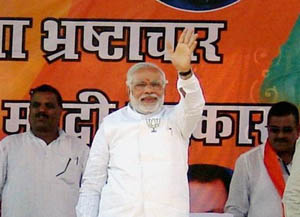New Delhi, Apr 13: The Prime Minister's Office will take the nod of Gujarat Government and Chief Minister Narendra Modi for releasing the correspondence exchanged with the then Prime Minister Atal Bihari Vajpayee after the post-Godhra riots in 2002.
The information was earlier denied by the Central Public Information Officer of the PMO S E Rizwi citing section 8(1)(h) of the RTI Act, without giving any reasons, which exempts information that would impede the process of investigation or apprehension or prosecution of offenders.
 The decision was overturned during the appeal before his senior Krishan Kumar, Director PMO, where the applicant had objected to the response of the CPIO saying he failed to give germane reasons behind denial of information.
The decision was overturned during the appeal before his senior Krishan Kumar, Director PMO, where the applicant had objected to the response of the CPIO saying he failed to give germane reasons behind denial of information.
The applicant had also underlined that the correspondence was 11 years old and was not likely to have an impact on the investigation, apprehension and prosecution of offenders.
Upholding the reasons given by the applicant, the appellate authority directed the CPIO to provide additional details with regards to the case.
"As regards contention that the grounds for exemption claimed under section 8(1) (h) are not tenable, CPIO PMO is directed to obtain fresh inputs in this regard and provide the same to the applicant within 15 working days," Krishan Kumar, Director and Appellate authority had decided.
In the latest response to six-and-a-half month old RTI application, Rizvi said after the appeal decision that the matter was referred to the office for fresh inputs.
"It is informed that third party (Gujarat Government and Modi in the present case) consultation under Section 11(1) of the RTI Act is underway on a similar request and response regarding disclosure of information in this regard will be provided to you after due process as envisaged in section 11 of the Act is completed," he said.
According to the section 11 of the RTI Act, a notice seeking views of the third party have to be taken with in five days of filing request but CPIO did not issue any such letter within the period.
The matter of third party consultation was raised citing an existing process which has been on seeking the views.
"The Central Public Information Officer or State Public Information Officer, as the case may be, shall, within five days from the receipt of the request, give a written notice to such third party of the request...," the Act says.
The RTI applicant had sought copy of all communications exchanged between the PMO and the Gujarat government between February 27, 2002 and April 30, 2002 on the law and order situation in the state.
The applicant had also sought copy of the communication exchanged between Vajpayee and Modi during that period which saw tense atmosphere in the state.
While refusing disclosure of information, the country's top office did not give any reasons as to how disclosure of information would attract section 8(1)(h) even though Delhi High Court has made it clear that cogent reasons be given while denying information under the clause.
"It is apparent that the mere existence of an investigation process cannot be a ground for refusal of the information; the authority withholding information must show satisfactory reasons as to why the release of such information would hamper the investigation process.
"Such reasons should be germane, and the opinion of the process being hampered should be reasonable and based on some material. Sans this consideration, Section 8(1)(h) and other such provisions would become the haven for dodging demands for information," Justice Ravindra Bhat had held.






Comments
Add new comment